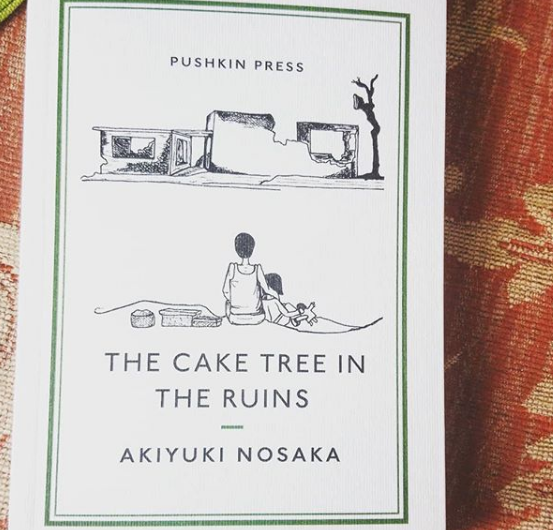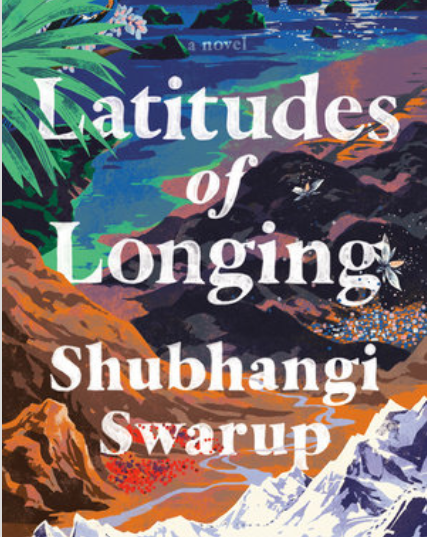Studio Ghibli’s movie “Grave of the Fireflies” about a brother and sister who try to survive during WWII in Japan is one of my favourite movies. But the fact that it was based on a short story by acclaimed Japanese novelist Akiyuki Nosaka got lost somewhere in the massive shadow of the Ghibli brand. I didn’t know it until I received “The Cake Tree in the Ruins”, a compact volume of his short stories from Pushkin Press for a review. And I can’t thank them enough for sending me this book. I read it in two sittings, and it left me wishing for more.
Surprising, considering that all the stories deal with the depressing subject of war and its tragic effects. At least on the surface of it. All the 12 short stories in this book either take place or are building up to end on the same day – 15th August, 1945.
“On 15th August, 1945, Emperor Hirohito gave a recorded radio address across Japan, in which he announced the surrender of Japan to the Allies. As such, it is considered the day the war ended…”
At once poignant, hopeful, and ironic, the stories in this collection tug at your hearts. Many of them highlight the absolute uselessness of war, and portrays the people who are really affected. It’s not governments and kingdoms but ordinary people. There are a few running themes that thread the stories together like the fight for survival, loss of family, and the effect of war on children.
There are very touching, heart wrenching moments. In “The Mother That Turned into a Kite,” little Katchan’s mother tries to save him from rapidly encroaching flames by rubbing her own sweat over his face “as if it were lotion.” In “The Old She-Wolf and The Little Girl” the titular she-wolf finds a little girl who has been abandoned by her family, and cares for her because she “didn’t smell of the things the wolf hated the most, leather and gunpowder…”
Animals and children dominate the book with the majority of the stories featuring either one or both of them. There is a certain kindness that continues to exist in Nosaka’s universe even though torn apart by war. A boy cares for his parrot till the day he dies, a pilot gets attached to his pet cockroach, a zookeeper nearly starves himself to feed his beloved elephant, and a man is determined to honour his horse’s trust in him. Love shines incandescent even during these extremely dark times.
For me, the glittering jewels of the collection are “The Whale That Fell in Love with a Submarine” and “The Cake Tree in the Ruins.” The former brought tears to my eyes when I came to the part where the poor whale was desperately trying to save his beloved even after he was hit by a bomb. I cannot describe it more without giving away the ending but I can say that this story will stay in my mind for some time.
In “The Cake Tree in the Ruins” there is a beautiful tree that continues to blossom even when the village is burning and flames lick the sky relentlessly.
“Some trees surrounding a shrine a short distance from the ruins had survived, but all their leaves had been scorched by the heat from the flames. Yet the leaves on this mysterious tree in the ruins of the big old house seemed to be sprouting one after another with fresh green growth.”
Soon, a group of children finds that the leaves of the tree are edible, sweet even, and that the bark is soft. They surmise that it’s a cake tree.
“All of the children had forgotten what cake was – or rather they had never even known. They had only heard about it from the old women…” They had no idea that cake “was so scrumptious!”
And with that one sentence where he at once informs us of this incredibly sad fact and, at the same time, elevates us with the children’s sheer joy in tasting cake for the first time, Nosaka’s supreme talent is brought to the fore. Brilliant strokes like this are rife in the book. He is probably one of the few authors I have read who totally, completely brings alive the genre of magical realism. There is hopeful magic in his stories that is bleakly real. There are moments of illusory joy amidst tragic reality. Every story is a fairy tale. Every story is also something that happened just a few decades ago.
Nosaka’s words cling to you like steam to glass. Or should I say those of Ginny Tapley Takemori? If someone had handed over this book to me without telling me that it’s a translation, I never would have noticed. Smooth, evocative, and finely translated, Takemori’s words never waver but firmly places us in the setting and sentiment that Nosaka would have wanted us to feel.
This book might deal with a dark subject and you do feel the weight of senseless death. Yet, there are parts that I might venture to say are sweet and luminous. The stories are as deep and multi-layered, as beautiful and unique as the baumkuchen in the story of the cake tree. They are meant to be similarly savoured. Now, how can I not wish for more of them?
Rating: 5/5
Thank you again to Pushkin Press!



